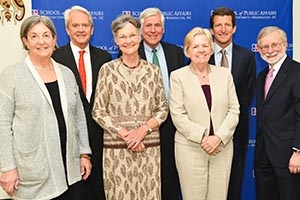On Campus
Annual Awards Ceremony Celebrates Environmental Champions

Left to right: Claire Barnett, William K. Reilly, Vanessa Henneke, Ben Henneke, Barbara Romzek, Jay Faison, and Dan Fiorino
Nearly 200 people gathered at the AU Katzen Art Center on March 30 for the 5th William K. Reilly Awards for Environmental Leadership. This year’s event honored individuals doing innovative work in the nonprofit sector and two outstanding SPA graduate students.
“Environmental protection, in my mind, is in more jeopardy now than it has been since the start of the modern environmental era in 1970s,” said Dan Fiorino, director of the Center for Environmental Policy at AU in his introductory remarks. “But with the leadership and commitment of the people in his room and the future leaders we recognize and nurture, we know we will get past this. But there is a great deal of work to be done.”
The first winner to be recognized, Claire Barnett, started the Healthy Schools Network in 1995. While many think of environmental protection being associated with outdoor natural resources, her work has focused on improving the indoor environment in the nation’s 133,000 school buildings serving 55 million children.
“Claire Barnett is a real visionary,” said Tim Fields, a CEP advisory board member. “She has challenged the nation to ensure that schools are environmentally responsible to all children, to personnel and to communities. The network is the nation’s leading voice for children’s environmental health at school.”
From mold in classrooms to tainted drinking water and the use of pesticides and lead paint, Barnett has called attention to problems in the nation’s aging -- often contaminated – school buildings. As executive director of the national 501(c)3, she has set up a clearinghouse to share information, produced reports on school health and safety, and has advocated for improvements at the local, state, and federal level.
“We know indoor air is 5 to 100 times more polluted than outdoor air,” said Barnett. “Most exposures occur in indoor environments. Children are particularly vulnerable to environmental health hazards.”
Barnett, whose own son was pesticide injured at school, said many children don’t recover from exposure environmental hazards. The answer lies in prevention.
“In our estimation, all children are at risk of additional health and learning issues due to solely to the unaddressed risks in their schools – and it’s across all states,” said Barnett, of New York. “We have piles of problems that affect children’s health and their ability to grow, think and learn.”
On April 4, the 15th annual Health Schools Day will be celebrated, thanks to Barnett’s efforts, to highlight these issues to policymakers and the public.
The second Reilly Award was given to Ben and Vanessa Henneke to honor their work with farmers in Tanzania, Kenya, India, and Uganda to address reforestation and provide opportunities to local communities. Although the Maine couple did not have a background in sustainable international development, they channeled their business skills and commitment to helping others to establish The International Small Group and Tree Planning Planting Program. What started as 75 farmers planning trees on degraded land in the late 1990s with the then new concept of carbon credits, TIST now has grown to involve 77,000 farmers and over 16 million trees planted.
The program trains local farmers – half women and half men – to plant trees that can grow fruits and nuts, produce shade, and provide firewood. TISTS collects and tracks data on the trees, which over time have benefitted struggling farmers and villages adversely affected by climate change. The also offset the sources of climate change by growing trees for storing carbon.
“Their enthusiasm for this work is totally contagious,” said Janet Peace, CEP advisory board member in her introduction of the Hennekes. “Two people with a good idea, one tree at a time, one farm at time, one village at a time – and they’ve made a real difference.”
Setting up TIST has been step of faith and more farmers want to join, said Vanessa Henneke upon accepting the Reilly award.
“We bring some good best practices, great seed bed information and conservation farming information, but I am far more educated by the people with whom I work in the countries than what we bring to them,” said Henneke.
William Reilly presented the SPA student scholarships to Lisa Flores, a first year student in the MPP program, and Nick Nayak, a first year student in the MPA program. In addition to the academic scholarships, SPA students may be placed in internships with environmental non-profit organizations under the Reilly program.
Wrapping up the event, Jay Faison gave a keynote talk on the need for energy innovation and support for research projects. Faison is the founder and chief executive officer of the ClearPath Foundation, which is focused on accelerating conservative clean energy solutions. He talked about the constraints on the rapid growth of renewable energy and argued the case for focusing on technology to help industry produce electricity in new ways. Faison said the country needs to diverse its energy sources, set big goals, and invest in public-private partnerships.
The annual William K. Reilly Awards – which are named after the former EPA Administrator and lifelong environmental champion – are presented annually at American University. The event promotes values that reflect focus, pragmatism, integrity, creativity, and the mentorship of future leaders

